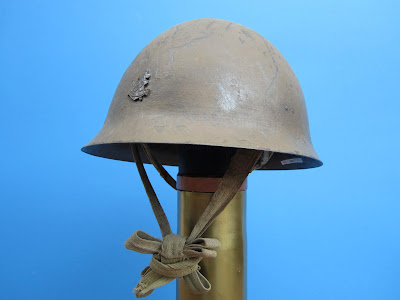For a quick analysis regarding Japanese atrocities before and during WWII, click here
They were truly the "Evil Empire".
Ladies and gentlemen the Japanese model 30-32 steel combat helmet:
With its distinctive acorn shape here is a distinctive symbol, and reminder, of the scourge of the
so-called Greater East-Asia Co-Prosperity Sphere
With long web chinstrap tapes and leather liner this non-ballistic and fairly lightweight helmet conqured much of the eastern hemisphere.
Front of helmet with insignia of the Japanese Landing Force
Close up of insignia. I believe that this helmet originally had the Army insignia on the front of it as I can just make out the indentations in the olive/brown paint of the five-pointed army star.
Leather liner and cotton chin tapes. The Liner is a three-finger system sewn to a leather band, riveted
to the shell.
This rivet appears to have lost its head (don't we all from time to time).
Liner mounting rivets are peened.
Right side with two tiny ventilation holes visible
Detail of script handwritten on liner.
(This, from reader Ted: I wandered around [your blog] a bit, and stumbled over your Japanese helmet, that evidently belonged to someone named Imai, perhaps with a given name of Shokichi).

Be advised that searching for Japanese war photos on "Google images" can present some very jarring images about their savage romp in China.
With some heavy scratches and moderate wear, I'm very happy to have this hard-to-come-by example in the collection. It is a particularly light helmet and the Greenish-brown paint has been brushed on and is rather thick in places.
Provenance:
This helmet was purchased on Okinawa Japan in the mid-1980s by my brother who was stationed there for two years with the U.S. Navy. He noted the difficulty of securing not just a helmet in this good condition, but of getting any Japanese helmet at all. Japan was so diligent in shedding its militarist past that most of these helmets were destroyed immediately
after the war.













